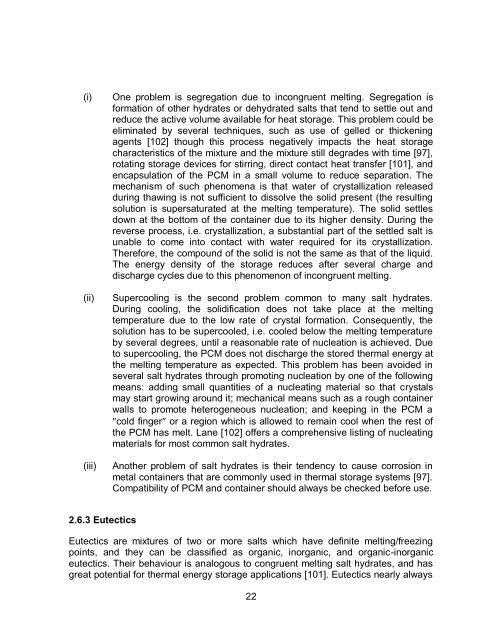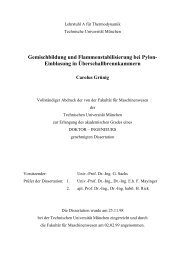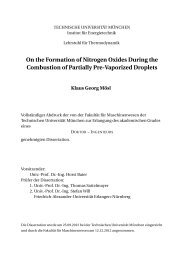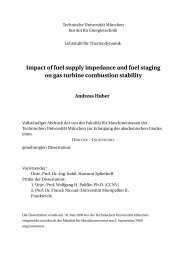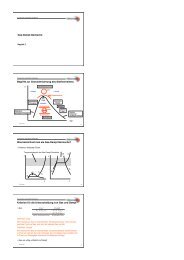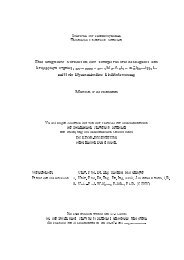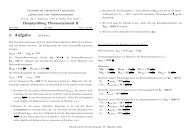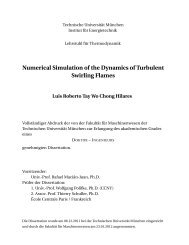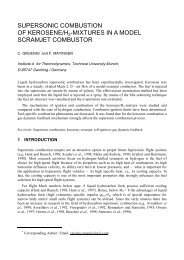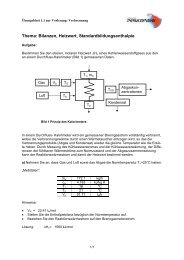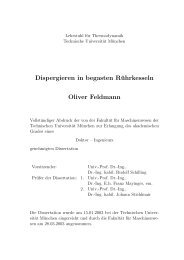Experimental and Numerical Analysis of a PCM-Supported ...
Experimental and Numerical Analysis of a PCM-Supported ...
Experimental and Numerical Analysis of a PCM-Supported ...
You also want an ePaper? Increase the reach of your titles
YUMPU automatically turns print PDFs into web optimized ePapers that Google loves.
(i)<br />
(ii)<br />
(iii)<br />
One problem is segregation due to incongruent melting. Segregation is<br />
formation <strong>of</strong> other hydrates or dehydrated salts that tend to settle out <strong>and</strong><br />
reduce the active volume available for heat storage. This problem could be<br />
eliminated by several techniques, such as use <strong>of</strong> gelled or thickening<br />
agents [102] though this process negatively impacts the heat storage<br />
characteristics <strong>of</strong> the mixture <strong>and</strong> the mixture still degrades with time [97],<br />
rotating storage devices for stirring, direct contact heat transfer [101], <strong>and</strong><br />
encapsulation <strong>of</strong> the <strong>PCM</strong> in a small volume to reduce separation. The<br />
mechanism <strong>of</strong> such phenomena is that water <strong>of</strong> crystallization released<br />
during thawing is not sufficient to dissolve the solid present (the resulting<br />
solution is supersaturated at the melting temperature). The solid settles<br />
down at the bottom <strong>of</strong> the container due to its higher density. During the<br />
reverse process, i.e. crystallization, a substantial part <strong>of</strong> the settled salt is<br />
unable to come into contact with water required for its crystallization.<br />
Therefore, the compound <strong>of</strong> the solid is not the same as that <strong>of</strong> the liquid.<br />
The energy density <strong>of</strong> the storage reduces after several charge <strong>and</strong><br />
discharge cycles due to this phenomenon <strong>of</strong> incongruent melting.<br />
Supercooling is the second problem common to many salt hydrates.<br />
During cooling, the solidification does not take place at the melting<br />
temperature due to the low rate <strong>of</strong> crystal formation. Consequently, the<br />
solution has to be supercooled, i.e. cooled below the melting temperature<br />
by several degrees, until a reasonable rate <strong>of</strong> nucleation is achieved. Due<br />
to supercooling, the <strong>PCM</strong> does not discharge the stored thermal energy at<br />
the melting temperature as expected. This problem has been avoided in<br />
several salt hydrates through promoting nucleation by one <strong>of</strong> the following<br />
means: adding small quantities <strong>of</strong> a nucleating material so that crystals<br />
may start growing around it; mechanical means such as a rough container<br />
walls to promote heterogeneous nucleation; <strong>and</strong> keeping in the <strong>PCM</strong> a<br />
cold finger or a region which is allowed to remain cool when the rest <strong>of</strong><br />
the <strong>PCM</strong> has melt. Lane [102] <strong>of</strong>fers a comprehensive listing <strong>of</strong> nucleating<br />
materials for most common salt hydrates.<br />
Another problem <strong>of</strong> salt hydrates is their tendency to cause corrosion in<br />
metal containers that are commonly used in thermal storage systems [97].<br />
Compatibility <strong>of</strong> <strong>PCM</strong> <strong>and</strong> container should always be checked before use.<br />
2.6.3 Eutectics<br />
Eutectics are mixtures <strong>of</strong> two or more salts which have definite melting/freezing<br />
points, <strong>and</strong> they can be classified as organic, inorganic, <strong>and</strong> organic-inorganic<br />
eutectics. Their behaviour is analogous to congruent melting salt hydrates, <strong>and</strong> has<br />
great potential for thermal energy storage applications [101]. Eutectics nearly always<br />
22


